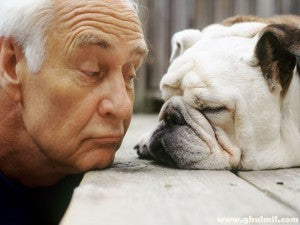The harsh reality is that our dogs have shorter lives compared to ours. The tiny little fur ball that you adopted and loved as your own baby will grow old soon before you even know it. A dog owner must strive to give his/her pet the best of everything to enrich & fill up their short lives with happiness. When your pet enters the senior phase, it is important to look out for signs that tell your dog is aging. A thorough knowledge of these signs can help you to add some more years to an already senior dog’s life.
- Increase in Body Weight: As the age advances a dog’s metabolism will slow down this could result in a chubbier pooch. Also issues pertaining to thyroid can be responsible for weight gain. Sometimes the level of exercise greatly reduces in older dogs.
To counteract the problem of weight gain you will have to make changes in your pet’s diet as well as incorporate a suitable exercise regimen that your senior dog can adhere to. Your vet can outline the necessary changes you need to make in the above areas depending upon its breed type & size. A low calorie diet may be prescribed. As far as exercising an old dog is concerned take it for shorter walks albeit frequent ones. A vet check up will also help to dispel doubts regarding any serious medical condition that could be responsible for obesity.
Sometimes poor dental health in older dogs can be responsible for weight loss as eating food becomes a painful experience. Regular brushing can help maintain good oral hygiene. Dog Dental treats/chews are tasty snacks that help in reducing plaque build-up on teeth.
- Ignoring your summons: This could be due to a hearing loss. Your elderly dog isn’t being disobedient or obstinate in any way; the old chap’s ability to hear is deteriorating.
It is best to pair your voice commands with hand gestures/signals. Hearing difficulties could also cause the pet to bark randomly or look surprised for no reason.
- Problems with sight: Visual impairment is an age related issue and it has been observed that blind dogs adjust exceptionally well amid this loss.
A visit to the doctor’s clinic should be made as and when you notice a change in your dog’s vision as a check-up will help to highlight serious problems if any, related to reduction in vision or complete blindness. Blindness in some cases could be a sign of ailments relating to the kidney, heart, and liver. It could also signal the presence of canine Diabetes, the incidence of which is rising in dogs. Also while walking a blind dog you must opt for neighboring areas that your dog is familiar with as unfamiliar stimuli can scare the dog.
You may also notice a bluish or whitish cloud over the canine’s eyes. While the bluish mist like formation is harmless and develops due to old age. The white haze could be due to cataracts leading to blurred vision.
- Dog Dementia: You may notice that your dog is behaving oddly. It may fail to recognize otherwise known people, could appear confused in familiar surroundings or even irritable for no apparent reason.
-
Sleeping More: Your elderly companion would like to indulge itself to more hours of sound sleep. This is in stark contrast to the sleeping pattern found in young dogs.
- Lumps: It is important to regularly run your hands through the dog’s coat to detect the presence of lumpy deposits. The vet will advise if they are cancerous or benign fatty deposits/tumors.
- Deterioration in Coat Quality: Age related issues also involve the loss of shine, dryness, scaliness and itchiness in the coat. Hair loss is also experienced by some old dogs.
Hypothyroidism can cause the above issues and good news is that this condition is treatable. Regular grooming and brushing of the coat does help to some extent to lock the luster in your dog’s coat.
- More Breaks To Relieve Itself: Senior dogs definitely require more bathroom breaks in a day. Take your old friend for short frequent walks so that the dog can relieve itself outdoors instead of accidentally peeing in the house. If the frequent outdoor toilet breaks fail to avert urinary incontinence, it is best to visit the doctor at the earliest. Old dogs may suffer urinary incontinence due to fluctuation in hormone levels, urinary tract/bladder infections, Diabetes, and Kidney or Liver disease among other causes.
- Your Pooch Has Slowed Down: Old dogs suffer from joint pain, arthritis and thyroid issues that can slow them down and you will notice your friend has lost the vigor with which it could dash up the stairs or beat you in a race. It will also take a longer time to get up after lying or sitting for an extended time.
Aging is a natural phenomenon and once your canine family member enters the senior phase make sure to take to it to the vet for a check-up every six months. It is important to stick to the vet’s prescription with regard to the type of medication/supplements and their dosage. To keep your dog’s brain alert and going, stimulate it using new toys, tricks and training techniques. You can introduce your dog to a different walking track once in a while as new smells and surroundings will help to overall invigorate the dog. However if the pet suffers from blindness or hearing problems it is best to stick to familiar routes/dog parks while walking and exercising it. Also make sure the inside of the home as well as the courtyard is free of dangerous objects and clutter that could come in the pet’s path and injure it.
Article Resource:
http://www.pedigree.com/all-things-dog/article-library/common-signs-of-aging.aspx
http://iheartdogs.com/11-signs-of-aging-every-dog-owner-needs-to-look-for/

